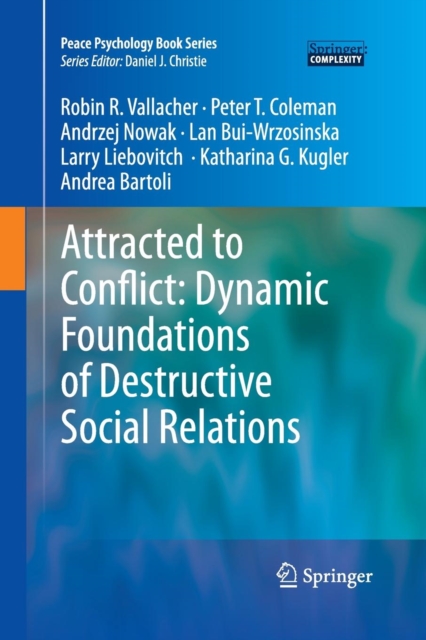
Attracted to Conflict: Dynamic Foundations of Destructive Social Relations Paperback / softback
by Robin R. Vallacher, Peter T. Coleman, Andrzej Nowak, Lan Bui-Wrzosinska, Larry Liebovitch, Katharina Kugler, Andrea Bartoli
Part of the Peace Psychology Book Series series
Paperback / softback
Description
Conflict is inherent in virtually every aspect of human relations, from sport to parliamentary democracy, from fashion in the arts to paradigmatic challenges in the sciences, and from economic activity to intimate relationships. Yet, it can become among the most serious social problems humans face when it loses its constructive features and becomes protracted over time with no obvious means of resolution. This book addresses the subject of intractable social conflict from a new vantage point. Here, these types of conflict represent self-organizing phenomena, emerging quite naturally from the ongoing dynamics in human interaction at any scale—from the interpersonal to the international. Using the universal language and computational framework of nonlinear dynamical systems theory in combination with recent insights from social psychology, intractable conflict is understood as a system locked in special attractor states that constrain the thoughts and actions of the parties to the conflict. The emergence and maintenance of attractors for conflict can be described by means of formal models that incorporate the results of computer simulations, experiments, field research, and archival analyses. Multi-disciplinary research reflecting these approaches provides encouraging support for the dynamical systems perspective. Importantly, this text presents new views on conflict resolution. In contrast to traditional approaches that tend to focus on basic, short-lived cause-effect relations, the dynamical perspective emphasizes the temporal patterns and potential for emergence in destructive relations. Attractor deconstruction entails restoring complexity to a conflict scenario by isolating elements or changing the feedback loops among them.
The creation of a latent attractor trades on the tendency toward multi-stability in dynamical systems and entails the consolidation of incongruent (positive) elements into a coherent structure. In the bifurcation scenario, factors are identified that can change the number and types of attractors in a conflict scenario. The implementation of these strategies may hold the key to unlocking intractable conflict, creating the potential for constructive social relations.
Information
-
Item not Available
- Format:Paperback / softback
- Pages:242 pages, XII, 242 p.
- Publisher:Springer-Verlag Berlin and Heidelberg GmbH & Co. K
- Publication Date:15/09/2012
- Category:
- ISBN:9783642426650
Other Formats
- PDF from £93.08
Information
-
Item not Available
- Format:Paperback / softback
- Pages:242 pages, XII, 242 p.
- Publisher:Springer-Verlag Berlin and Heidelberg GmbH & Co. K
- Publication Date:15/09/2012
- Category:
- ISBN:9783642426650










